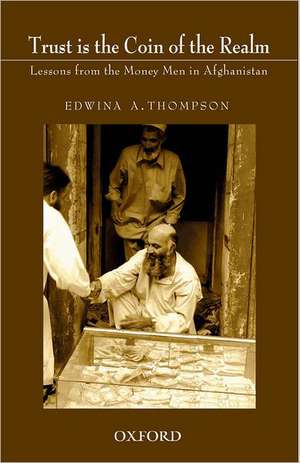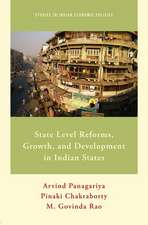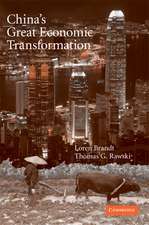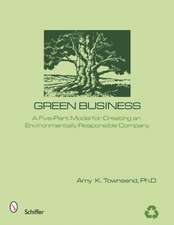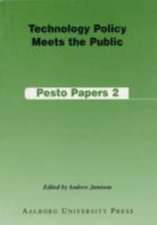Trust is the Coin of the Realm: Lessons from the Money Men in Afghanistan
Autor Edwina A. Thompsonen Limba Engleză Hardback – 12 oct 2011
Preț: 198.02 lei
Nou
Puncte Express: 297
Preț estimativ în valută:
37.90€ • 41.19$ • 31.86£
37.90€ • 41.19$ • 31.86£
Carte tipărită la comandă
Livrare economică 18-29 aprilie
Preluare comenzi: 021 569.72.76
Specificații
ISBN-13: 9780195473520
ISBN-10: 0195473523
Pagini: 350
Dimensiuni: 161 x 240 x 25 mm
Greutate: 0.7 kg
Editura: Oxford University Press
Colecția OUP Pakistan
Locul publicării:Oxford, Pakistan
ISBN-10: 0195473523
Pagini: 350
Dimensiuni: 161 x 240 x 25 mm
Greutate: 0.7 kg
Editura: Oxford University Press
Colecția OUP Pakistan
Locul publicării:Oxford, Pakistan
Recenzii
A fascinating foray down the alleys of the 'hawala' world, this book is as rich in its insights as it was daring in its research. There are lessons here for both policy makers and scholars, for the concerned citizen as well as the international expert. If we insist on behaving as 'ugly Westerners', Thompson leaves us without excuse.
Thompson's masterful approach has tapped into a crucial intellectual and very human component that we must draw upon in order to understand the nexus of terrorism, religion, the worlds of licit and illicit finance, corruption, government legitimacy, and insurgency. She has woven these strands together brilliantly in a manner that should inform the design and implementation of coherent peace-making and state-building strategies, not just in Afghanistan, but all around the world. Amust read for policy makers, practitioners, and informed publics.
Thompson offers an analysis which boasts a rare combination of theoretical and policy relevance. While scholars will find much to learn from her approach to the interplay of institutions, networks, and practices, her empirical analysis of the interplay of development trends, state failure, Islamic financial networks, and money laundering challenges a number of assumptions that have both shaped approaches to the War on Terror and perhaps even undermined its effectiveness.
The highly topical nature of the research and subject matter clearly came at a heavy personal price given that a white, Western foreigner was conducting interviews at the height of the War on Terror on Afghanistan within Afghanistan...such interviews entailed a high degree of trust between her and the interviewee, which would have been a vital pre-requisite even in the absence of the War on Terror. Fortunately, her efforts have been richly rewarded given that this is a remarkablepiece of work.
Thompson's masterful approach has tapped into a crucial intellectual and very human component that we must draw upon in order to understand the nexus of terrorism, religion, the worlds of licit and illicit finance, corruption, government legitimacy, and insurgency. She has woven these strands together brilliantly in a manner that should inform the design and implementation of coherent peace-making and state-building strategies, not just in Afghanistan, but all around the world. Amust read for policy makers, practitioners, and informed publics.
Thompson offers an analysis which boasts a rare combination of theoretical and policy relevance. While scholars will find much to learn from her approach to the interplay of institutions, networks, and practices, her empirical analysis of the interplay of development trends, state failure, Islamic financial networks, and money laundering challenges a number of assumptions that have both shaped approaches to the War on Terror and perhaps even undermined its effectiveness.
The highly topical nature of the research and subject matter clearly came at a heavy personal price given that a white, Western foreigner was conducting interviews at the height of the War on Terror on Afghanistan within Afghanistan...such interviews entailed a high degree of trust between her and the interviewee, which would have been a vital pre-requisite even in the absence of the War on Terror. Fortunately, her efforts have been richly rewarded given that this is a remarkablepiece of work.
Notă biografică
Dr Edwina A. Thompson draws from a diverse career working with humanitarian organisations, governments, and the military in complex environments-from Somalia, Sudan and Sri Lanka to Papua New Guinea, Pakistan, and of course Afghanistan. Her academic work is original and inter-disciplinary, pushing forward on a number of theoretical and policy debates that have implications for the very meaning of social capital in 'failed states'.
